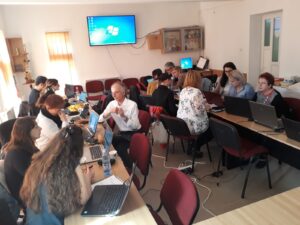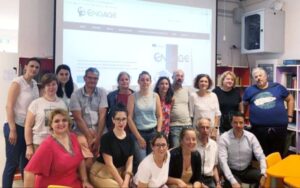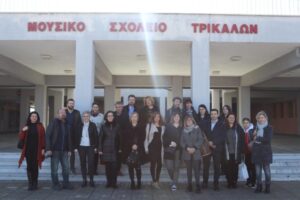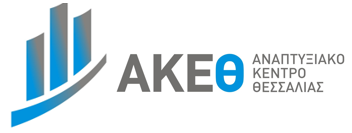ENtrepreneurial GAmes for Growing Europeans
Start:
01-10-2018
End:
30-09-2020
Project Reference:
2018-1-EL01-KA202-047749
EU Grant:
240340 EUR
Programme:
Erasmus+
Key Action:
Cooperation for innovation and the exchange of good practices
Action Type:
Strategic Partnerships for vocational education and training
Project Summary
EN.GA.G.E. – ENtrepreneurial GAmes for Growing Europeans
“Education institutions should be encouraged to become more entrepreneurial in their wider approach, to ensure that they develop and live a culture of entrepreneurship and innovation through their missions, leadership, stakeholder engagement, curricula and learning outcomes.” (Commission, Entrepreneurship 2020 Action plan)
Promoting early entrepreneurial mindsets in education is one of the most important missions in Europe 2020. The Commission states that entrepreneurial mindsets and innovation mentality is the future growth engine of the European economy.
However, the Commission also states and recognizes that this represents no less than a cultural revolution in European education, and that there are no short-cuts to foster entrepreneurial mentality in schools: entrepreneurial mentality cannot be taught in traditional ways and cannot be guided by theory and research. Entrepreneurial mentality must be practiced and experienced through experimental learning and through opening schools to the wider community.
The way forward is therefore to review, produce, document and disseminate entrepreneurial practice in schools and role-models to share across European education. EN.GA.G.E. aims to be a significant and visible contribution to such practice and to be a role-model for schools in the European community. A concrete outcome will be an informal European network for game-based entrepreneurial learning in primary and secondary schools.
As practicing entrepreneurial mindsets in schools is not an adjustment of current practice, or an improvement of well-established teaching approaches, but precisely a “sea change” as the Commission puts it, including fundamental changes in school mentality and creating new collaborative infrastructures in the community, the EN.GA.G.E. project requests two years of experimentation and documentation.
The project will produce the following types of impact:
- Develop a sense of initiative among the young students, different from the traditional object-role of teaching
- Develop teacher teams’ capacity to create entrepreneurial dimensions in cross-subject and project based activities
- Develop an entrepreneurial atmosphere in the school, including management level
- Foster an increasing interest in the community to engage in school activities and projects
- Offer schools across Europe practice-based guidance and digital tools
- Contribute to networks of entrepreneurial schools in Europe
The project partnership includes school practice partners, knowledge generating partners as well as entrepreneurial partners, and then presents strong and sustainable double national partnerships from Italy, France, Romania, and Greece.
The key outcomes of the project will be:
- Study/research on game-based entrepreneurial learning methodologies in Europe
- EN.GA.G.E. digital games for entrepreneurial education in primary and secondary schools
- Policy recommendations “How to EN.GA.G.E. teachers, pupils and communities in entrepreneurial learning”
What is unique about the EN.GA.G.E. mission?
- An uncompromised user-driven approach
- A strong community approach, including private organisations
- An uncompromised entrepreneurial learning approach: no transmission possible, only experience-based knowledge creation
- A very realistic approach accepting that the project forms part of a cultural revolution expected to take decades
- A strong focus on the usability and quality of the final outcomes
- A very strong will to document processes, as this is the only way to capture entrepreneurial experience
- A well-balanced European partnership with a strong inclusion of Southern and Eastern countries, taking into account that the final guidance should be relevant to schools all over Europe, not only in selected readiness countries
- A strong will to continue the obtained results in the EN.GA.G.E. informal network
Coordinator:
- Istituto Comprensivo Panicale – Piegaro – Paciano – ITALY
Partners:
- ANAPTIXIAKO KENTRO THESSALIAS – GREECE
- UNIVERSITATEA DIN PITESTI – ROMANIA
- PALATUL COPIILOR PITESTI – ROMANIA
- EUROPEAN GRANTS INTERNATIONAL ACADEMY SRL – ITALY
- MOUSIKO SCHOLIO TRIKALON – GREECE
- Conservatoire National des Arts et Métiers des Pays-de-la-Loire – FRANCE
- Lycee professionnel Rene COUZINET – FRANCE





